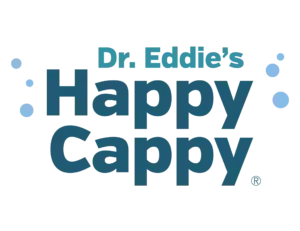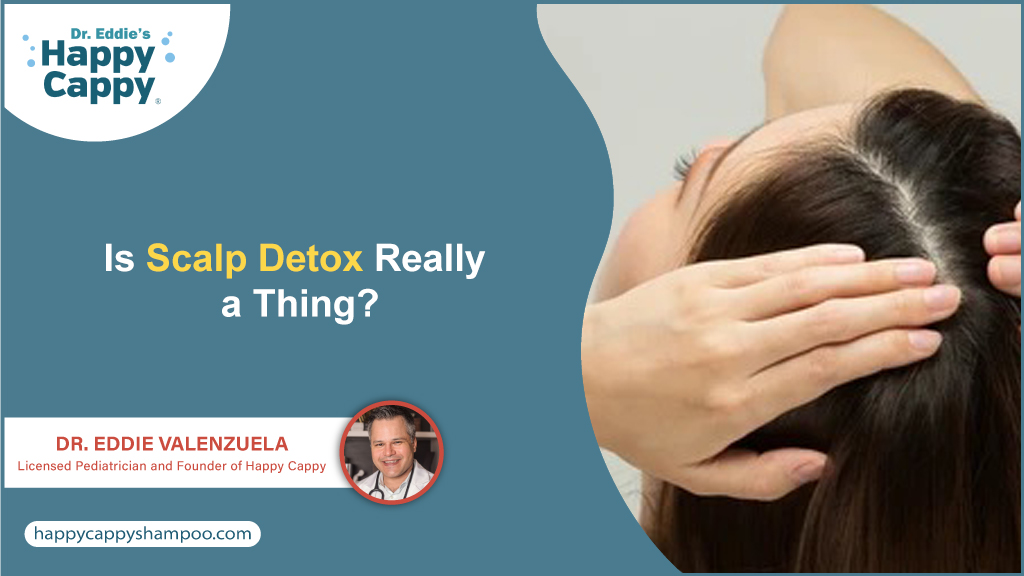
The face has always enjoyed center stage in the quest to present one’s healthiest appearance to the world. But seemingly overnight, the scalp is enjoying a rise “to the top” of health trends, with buzzwords like “Scalp Detox” and “Scalp Health” making the rounds in beauty magazines.
Some salons are even touting “scalp Detox Treatments.”
Why is a healthy scalp important, and does the scalp actually need to be detoxed? Is the average head of hair riddled with harmful toxins, heavy metals, and chemicals? Or is this just another buzzy beauty trend designed to sell you high-priced products and services?
What is Scalp Detox?
Scalp detox is not a medical treatment; in fact it is a beauty treatment. It is basically deep cleaning, or you can say a facial for your scalp to provide a healthy environment for hair to grow.
It is aimed to nourish the scalp and remove excess buildup of sebum, dead skin cells, and hair products. People who are experiencing dry, oily, itchy scalp or skin conditions like dandruff and seborrheic dermatitis are most likely to think of getting a detox.
If you are not experiencing any of these issues, then getting a scalp detox from those fancy salons is just wasting your money on something that may not be as beneficial for your scalp as it sounds.
Signs You Need a Scalp Detox
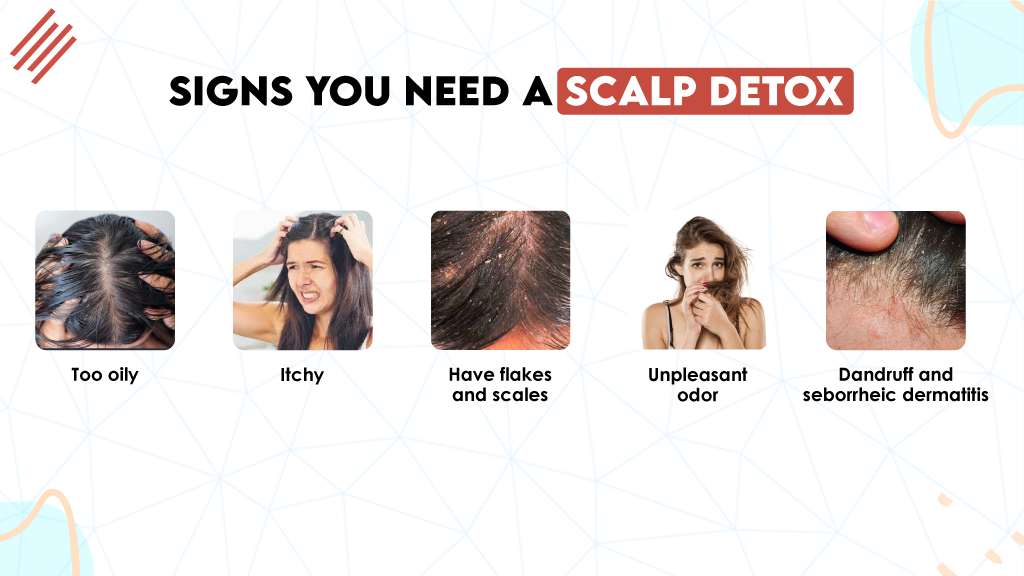
If you have a healthy scalp, then there is no need to detox it. Regular washing is just enough to detox it. However, in some cases, scalp detox becomes essential, and some of these are if your scalp is:
- Too oily
- Itchy
- Have flakes and scales
- Unpleasant odor
- Have dandruff and seborrheic dermatitis
If you are experiencing any of the above, you can think of scalp detox, however it is essential to determine the right way to do it to avoid worsening the conditions or any other complications like hair loss.
Should a Scalp Be Detoxed?
“It’s a lot of hocus pocus,” says Doctor Eddie Valenzuela, who specializes in treating scalp and skin issues, which affect as many as 1 out of every 3 people.
“People want answers. They want to do something. And I see these modern-day snake oil salesmen who appeal to that need,” says Dr. Eddie, adding “They talk a good game using words that sound legitimate or trendy but have little basis in reality or science.”
Part of the scalp detox appeal is that its proponents base their approach on facts that appeal to our common sense, like what we know to be true about skincare.
For example, you already know the skin on your face and body benefits from exfoliation, unclogging pores, removing impurities, and promoting new cell growth, giving skin a fresh glow. Since your scalp is skin, the idea of “exfoliating your scalp” or “detoxing your scalp” can start to make sense.
“But an exfoliation on your scalp won’t do anything but potentially cause irritation,” says Dr. Eddie, who says, “It is unlikely a pediatrician or doctor will ever tell you to get a scalp detox.”
If the idea of luxurious oil massages and aloe vera scalp rubs sounds good to you…absolutely enjoy them.
But if the dryness, flaking, and itching you’re experiencing is based on a skin condition like dandruff or seborrheic dermatitis, you’ll want to keep an eye on your scalp to see how it reacts to these “special” treatments to make sure they don’t have the opposite effect on your head.
Scalp Detox Treatments
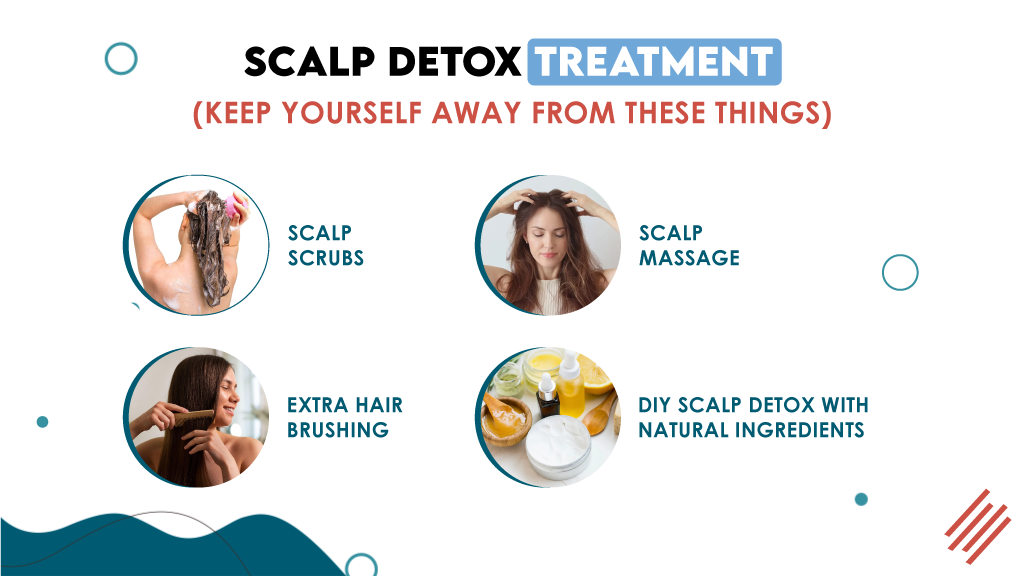
So we ran down the list of hot “Scalp Detox” treatments with the doctor. Let’s see what he has to say about them.
Scalp Scrubs – “You’re going to irritate your scalp more”
Scalp Massage – “It releases feel-good hormones and decreases stress, which is always positive. But the actual mechanical act may not show a visible improvement to your scalp.”
Extra Hair Brushing – “Again, something that feels soothing and could contribute to your overall sense of well-being, but may not actually improve scalp health.”
DIY Scalp Detox with Natural Ingredients – “You can make a fruit salad up there, but it won’t help.”
Some other common products that are used for detoxing are pre-shampoo cleansers, serums, masks, and exfoliants. But all of these tend to strip away essential oil from your scalp and leave your hair looking dry, rough, and brittle.
How to Detox Your Scalp and Make It Healthy?
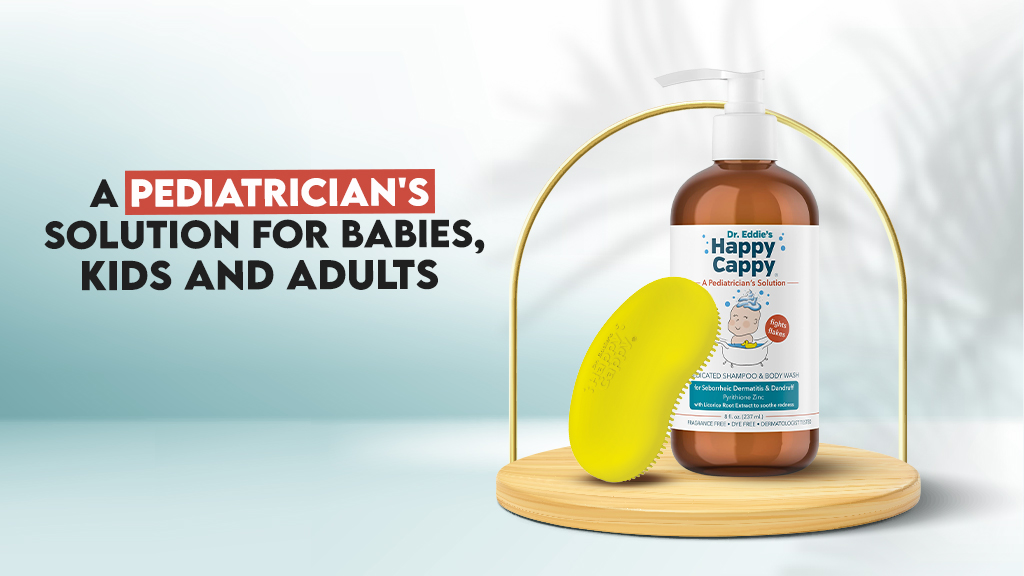
The reality of scalp health isn’t quite so glamorous. Or expensive. All the touted “signs that you need a scalp detox” are overwhelmingly plain old dandruff. In more aggravated cases, it’s seborrheic dermatitis.
The best way to detox your scalp is just by regularly washing it and leaving no product residue behind. Here is how you can make your scalp healthy.
Choose the Right Products
And the doctor – who specializes in treating children with cradle cap, seborrheic dermatitis and eczema – says the solution may be as simple as an inexpensive bottle of over-the-counter medicated shampoo.
“Do yourself a favor and get yourself an OTC medicated shampoo and use it for several days in a row or at least a week of daily use,” says Dr. Eddie, who recommends you choose a brand with no fragrance or dyes.
“Try that before you spend big money on a detox program,” he says, “then once it’s under control, you can keep using the medicated dandruff shampoo twice a week to maintain your scalp free of flakes, irritation and itchiness.”
Dr. Eddie formulated his own shampoo and body wash for the very gentlest of his patients…babies. Whatever product you choose, he encourages people to go the over-the-counter route in the search for scalp health, especially if you feel itching, discomfort, flaking or even crusting.
Brushing your Hair
You must regularly brush your hair. Doing this helps take the sebum from the hair follicles and scalp to the ends of hair strands, which makes your hair look healthy and nourished.
Regular brushing can also prevent excess oil, flakes, and dead skin cells buildup on the scalp. If you are dealing with seborrheic dermatitis or dandruff, or your baby has a cradle cap, then you can use a cradle cap brush.
This specially formulated brush will help you remove loose scales and flakes, prevent future build-up, enhance blood circulation, and promote relaxation.
The Best Way to Wash Your Scalp and Detox at Home
Then what? Is it as simple as just washing your hair? Yes and no.
“A lot of people just wash their hair and don’t really make it to their scalp to work in the product, especially if they have a lot of hair, or thick hair, or oily hair,” says Dr. Eddie.
- He recommends people wash their hair twice, “and let the medicated shampoo sit there on the scalp during the second wash for a few minutes. That allows for the active ingredient to really get in there and do its work.”
- Flaky, itchy hair will also benefit from more frequent washing. The doctor recommends a minimum of 2 to 3 times a week.
- And because 5 different active ingredients comprise the realm of OTC Dandruff and Seborrheic Dermatitis shampoos, the doctor says you may want or need to rotate through different kinds to see which ingredient best works on you.
- You may even need to switch between OTC formulas when the scalp gets a diminishing response to one particular ingredient. Fortunately, having an array of these shampoos won’t break the bank.
“Ultimately, I’m glad the scalp is getting more attention in the beauty press,” says Dr. Eddie, but only if it ultimately leads people to good information that helps people truly feel better. “Because expensive hocus-pocus is toxic.”
Conclusion
A scalp detox is deep cleansing of the scalp just like you do for your face. Some widely used scalp detox treatments are serums, pre-shampoo cleansers, exfoliants, and scalp scrubs.
Scalp detox is essential for people who are experiencing issues like itching, irritation, flaking, and oil build-up on the scalp. Or, simply put, you can say those who are experiencing dandruff, seborrheic dermatitis, and cradle cap need a scalp detox.
And, according to an expert pediatrician, the best way to detox your hair is by regularly washing it with a medicated OTC shampoo and body wash. The rest of the scalp detox treatments, whether they are done at the salon or at home, can make your scalp and hair dry and possibly cause irritation.
Your scalp is also detoxed when you brush it regularly. This helps in removing flakes and prevents future build-ups. But do not over-brush your hair. It can damage the hair follicles and lead to hair loss.
FAQs
How do I cleanse my scalp?
The best way to cleanse your scalp is to use a fragrance-free, paraben-free, sulfate-free, and phthalate-free shampoo to gently cleanse your scalp. Apply the shampoo and massage it with your fingertips before rinsing it off.
How do I clean my scalp from buildup?
You can clean your scalp from oil, flakes, dirt, or dead skin cells buildup by using a shampoo that is specially formulated to thoroughly cleanse your scalp without irritating it. If the flakes are thought to be dandruff, use a medicated anti-dandruff shampoo. Brushing your hair regularly with a cradle cap brush or even a regular brush can also help clean the buildup and prevent future buildup.
Does detoxing your hair help hair growth?
Yes, cleansing the scalp on a regular basis with a gentle shampoo that is free from harsh chemicals is the best way to detox it. This will help remove the build-up on the scalp, unclog the hair follicles, and make it easier for nutrients to reach the scalp and promote healthy hair growth.
How do you know if your scalp needs a detox?
A few signs that indicate that your scalp needs to be detoxed are:
Itchy scalp
Excess oil buildup on the scalp
Flaking and scaling
Has dandruff or seborrheic dermatitis
How to deep clean hair follicles?
You can deep clean your hair follicles by regularly washing them. Use a gentle medicated OTC shampoo to wash your hair. Leave it on your scalp for a few minutes before rinsing it so that it can thoroughly saturate the scalp and deep cleanse it.
